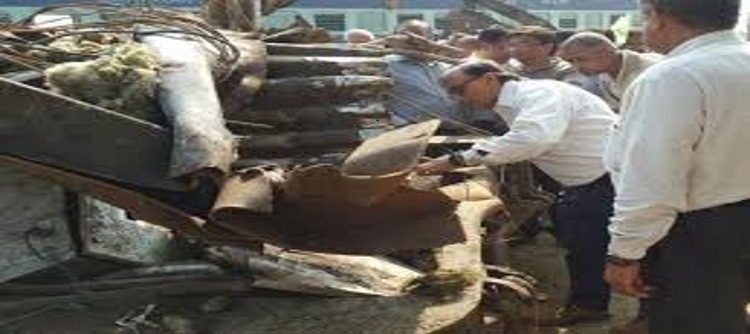
Commissioner, Railway Safety Shailesh Pathak on Monday visited Khatauli in Uttar Pradesh’s Muzaffarnagar where 14 coaches of Kalinga Utkal Express derailed on Saturday claiming 22 lives. Pathak and his team inspected the accident site and also met the local people.
Meanwhile, the two-day long statutory enquiry into the rail accident will begin on Tuesday in Divisional Railway Manager’s office in Delhi. The railways had on Sunday sent on leave three senior officials, suspended four officials and transferred one official following the train tragedy.
At least 22 people died and over 156 injured when the Haridwar bound train coming from Puri in Odisha derailed on Saturday evening.
Railways amending Guidelines on Safety checks
With yet another train derailment claiming 23 lives, the Railways is going back to drawing board, amending guidelines on safety checks to avoid repeat of such incidents in future. There have been at least 23 rail accidents across India since 2014.
Sources opined that though one might see a proactive Railway ministry on social media, the ground situation speaks a different story. Now, with the rescue work at Utkal Express mishap site over, the Railways feels that it is time to plug the loopholes and fix the problem areas.
“We will issue necessary safety guidelines once the Commissioner of Railway Safety is through with his probe report,” said Vinod Kumar, Advisor (Safety), Railway Board. The Central and Western Railway officials claim that they too are expecting some sort of guidelines on maintaining safety in the days to come.
Guidelines apart, one of the possible causes behind this derailment is said to be the lack of coordination between the rail authorities and gangmen who maintain tracks. Sources said the gangmen alone cannot be faulted as across Indian Railways there is a practise of gangmen being asked to do personal chores at rail quarters and bungalows.
Not just this, the Railways pays little heed to the rail representatives and associations. For instance the Railway ministry has appointed commuter representatives and formed committees who discuss problems related to train travel. These are called Zonal Railway Users’ Consultative Committee (for the entire zone like CR, WR), Divisional Railway Users’ Consultative Committee (Mumbai Division), which are meant to discuss the issues faced by commuters.
“For the last two years, there has been only two meetings with the Railways,” said Subhash Gupta, member, ZRUCC. These members take stock of the issues faced by people and then discuss it with the railway authorities.
“Ideally, these meetings should take place once in every three months, but it rarely happens. Moreover, the rail authorities show scant interest in holding such meetings,” said Madhu Kotian, member, ZRUCC.
Blaming the Railways for the accidents, they claim that the latter pay little heed to their suggestions concerning rail safety.
